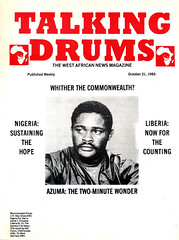The Ties That Divide Us
Then it all changed, from the all white, same stock club, has expanded beyond recognition of the original embers and in near panic, the rules have been changed. People have decided that there are stronger ties than the fact that they belonged to the British Empire at one time. Thus the mother country itself decided that it makes better sense to join their geographical neighbours in Europe, the Canadians accepted that they most probably have more in common with their American neighbours nd the Australians and New Zealanders felt that there was a limit to the advantages they could get from the mother country especially as the number of colonies declined and disappeared.
In the meantime, the new members had made it impossible for the 'Republic' to continue as a member. It not very easy for the South African Prime Minister to have to drink and sit at the same table with black people while back at home the Blacks are not allowed within his breathing distance.
Those Commonwealth Passport signs disappeared and membership in the club gave them no entitlements, even if a romantic attachment persists.
For some time, it appeared as though the British royal family was about the only sign that remained that the former colonies could identify with, as royal visits were popular but as many more countries adopted republican constitutions and the royal head disappeared from stamps and currencies, even that link weakened.
Moreover there are generations now in the "new Commonwealth" who cannot mumble their way through God Save The Queen, who have no recollection of Empire Day Celebrations and know nothing about Britannia ruling the waves.
It is not surprising therefore that in many of the newly independent Commonwealth nations, there are regular calls to leave the club. There does not seem to be much purpose in belonging to a club that has no rules, whose members have no obligations or advantages. It is hardly worth the expense that is involved. The Commonwealth does not even provide a mutually beneficial market for its members and while the African members especially provide an open market for the other members, their goods do not have similar access.
Since the Commonwealth has ceased to be a cosy club of people from the same stock and the great battles of have been largely finished, its continued existence must find a fresh purpose in moral and human standards that would be obligatory on members.
There must be something that binds member states together apart from having been part of the British Empire, the current state of the nations ought to be relevant to continued membership. There does not seem much that is in common when some of the members labour under tyrannical rule, when freedom of speech and assembly have disappeared from some countries and when some leaders have no mandate to rule from their people and some leaders are brutal murderers. If the Commonwealth cannot be identified as a grouping where certain basic standards can be required and insisted upon and member states would know that they have to maintain such requirements to guarantee their membership, then it is not an organisation worth preserving.
There is much reluctance about "Interfering" in the internal affairs of member states, thus tyrants and dictators are welcomed and tolerated and everybody pretends that somebody who shot his way into power and retains that power through the exercise of terror on his people, has the same status as another leader who governs through laid down rules and has to get a mandate from his people. Every constitutionally elected leader of a Commonwealth nation is cheapened by associating with murderous dictators.
It might very well be that if such standards were demanded, half the members would not be able to attend the Commonwealth Heads of Government meetings but at least, the Commonwealth would have been the one international group that gave no comfort to tyrants. It might then be a club worth belonging to and members might strive not to break the rules.
Presently, everybody knows that a ruler can come from fresh executions, he might have thousands of political prisoners in his jails and he might have force overthrown a constitutionally elected government, and he would be as welcome as everybody else.
At one time, it was the independence of Rhodesia, as it then was that occupied all the discussions at these meetings and this current one is expected to be dominated by the South African problem. The sanctions matter is something that is very close to the hearts of the majority of members, and Britain is currently the odd one out.
But then, the South African situation is so unnatural and unjust that, it does not matter how much Mr Botha and his friends resist it or how much comfort Mrs Thatcher gives them, the apartheid edifice will collapse. What then will provide a focus for the Commonwealth and what ties will bind member states together and what identification will there be for member states that will have some relevance to present day realities?
Unless the Commonwealth is willing to address this wider question, its only relevance will be that it is the only international organisation at whose meetings translators are not needed.
